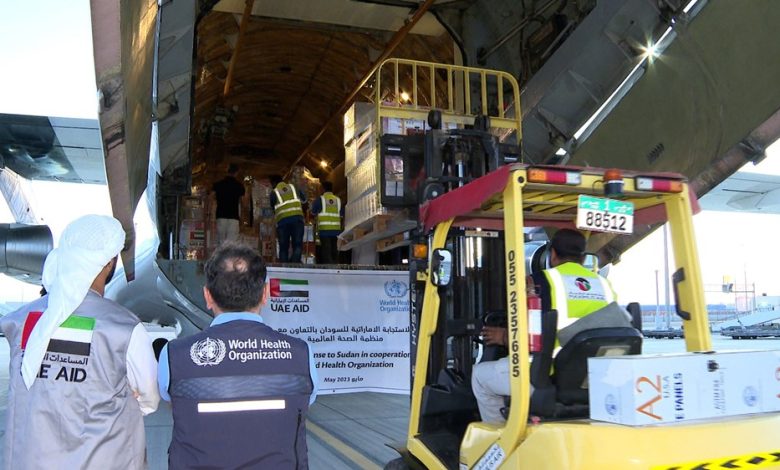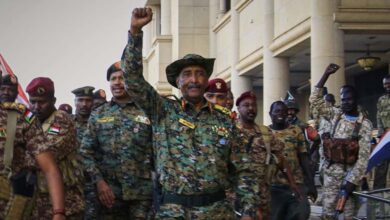The UAE sends urgent medical supplies to Sudan in cooperation with the World Health Organization

The United Arab Emirates (UAE), in cooperation with the World Health Organization (WHO), sent 30 tons of emergency medical supplies to Sudan, where a plane loaded with supplies for medical treatment of injuries, emergency surgery and essential drugs arrived at Port Sudan airport.
The US$444,000 shipment is the first to be delivered by the World Health Organization (WHO) by air to Sudan since the conflict began.

“MSF distributed supplies to health facilities that ran out of medical supplies days after the conflict erupted, in view of the large numbers of wounded.” The aircraft’s dispatch comes within the framework of the continuous relief efforts of the UAE to support the Sudanese people, and reflects the depth of its relations with Sudan, especially in light of the current situation.
The relief is an extension of the UAE’s humanitarian vision and a reflection of its relations with other countries based on human fraternity and a commitment to help others during crises and emergencies.
HE Minister of State for International Cooperation Reem Bint Ebrahim Al Hashimy said that the UAE continues to work closely with the World Health Organization (WHO) to ensure the success of the important logistical process to send urgent medical and food supplies to help address the current crisis in Sudan.
“In parallel to calls on all parties to the current conflict to immediately cease hostilities and calm the situation that is causing untold suffering to the Sudanese people, the UAE remains steadfast in its commitment to provide aid and assistance to countries in times of need,” she added. “The UAE is particularly focused on providing support to the most vulnerable people affected by the situation in Sudan, namely patients, children, the elderly and women, who are most at risk from the ongoing and extremely worrying conflict, and these relief flights will address the most urgent gaps in the provision of medical and food services.”
Al Hashimy stressed that the UAE’s firm human values make it imperative to continue to communicate with the world with unwavering sincerity to promote peace, security, safety and stability, not only at the regional level but also throughout the world.

She stressed that the UAE, along with its partners and the international community, continues to help the Sudanese people in times of crisis.
“Early this morning, a flight with 30 metric tons of health supplies worth US$444,000 left the WHO Global Logistics Hub in the UAE en route to Port Sudan in response to the current crisis in Sudan,” said Dr. Michael Ryan, Executive Director of the WHO Health Emergencies Program. Health supplies include enough to treat injuries, to cover emergency surgical supplies, and essential medicines to provide treatment to 165,000 people in dire need of humanitarian assistance after health facilities across the country announced that they had run out of essential health supplies and that national medical stores were no longer available due to the security situation. WHO sent two emergency logisticians on board the cargo plane to ensure these supplies are immediately distributed to 13 key health facilities to support healthcare workers and care for the needy.”
“WHO has another 30 tons of supplies to combat malaria and non-communicable diseases such as diabetes and hypertension, conditions that can become fatal if left untreated. These supplies and some 23,000 bags of blood are being processed at the WHO Global Logistics Center in Dubai’s World Humanitarian City, and WHO is currently exploring all possible ways to deliver these supplies to Sudan as soon as possible in collaboration with Sudan’s Ministry of Health.”
He noted that the WHO Global Logistics Center in the UAE became the focus of the rapid supply response to severe events globally with the support of more than 140 countries in all six WHO geographical regions.
He explained that the Center is the lifeline for Member States suffering from health emergencies caused by disease outbreaks, disasters such as floods, earthquakes and the impact of conflicts on health systems, and that the support provided by the United Arab Emirates enables the World Health Organization (WHO) to be at the forefront of responses to health emergencies, and to provide specialized medical assistance to those in need, wherever and wherever needed.
“As part of an effort to strengthen the global architecture for health emergency preparedness, response and resilience, the UAE and WHO are working hand in hand to deliver supplies to reach the world’s most vulnerable when they are most needed,” said the WHO’s Executive Director for Health Emergencies.

WHO’s Regional Director for the Eastern Mediterranean, Dr. Ahmed Al-Mandhari, said WHO continues to coordinate with the Sudanese health authorities to deliver essential health supplies through all available routes, explaining that because of the conflict, hospitals, pharmacies and healthcare facilities have run out of essential life-saving medicines. The arrival of an additional 30 tons of surgical and emergency supplies, in addition to essential medicines, will enable WHO to support 13 key health facilities and restore health care services to those in need.
“Our Global Logistics Center in Dubai plays a vital role in ensuring the continuous supply of health commodities,” said Dr. Al-Mandhari. We are grateful for the support of the UAE in facilitating our first demonstration of desperately needed supplies. Such support underlines our regional vision of health for all and for all.”
Medical aid provided by the WHO via the UAE accounted for nearly 55% of the medical supplies provided to Sudan from abroad during 2022, reflecting the UAE’s status as a major center for humanitarian response and support globally.












